
 |
The
Photographers
|

|

The
following biographical information was adapted from “Manitoba
Photographers, 1858 to Present” prepared by Dr. Gordon Goldsborough and
available on the website of the Manitoba Historical Society. It is
supplemented by information from local histories, local museums, and
online photo archives.
Photos
included are just samples from a large inventory of available images.
Anderson,
Mr. (Killarney) Anderson and Scott had a studio in in
1905
Ashley,
J.T. (Cartwright)
Bates, William John
(Baldur, Fairfax, Alexander, Elkhorn)
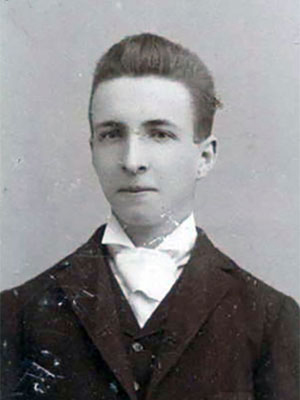 Born in
Ontario, Edward came to Manitoba in 1894 and worked as a teacher at
Dominion City School, where he met the prominent photographer George A.
Barrowclough. He supported his family as a teacher and itinerant
photographer, specializing in real photo postcards of small towns in
southern Manitoba and eastern Saskatchewan. The family lived at Newdale
while he was the Principal of Wellington School (1906-1907) and Newdale
School (1907-1908), and at Winnipeg (1908-1911) while he was a student
at the Manitoba Medical College. After graduation, he practiced
medicine in Manitoba and Saskatchewan.
Born in
Ontario, Edward came to Manitoba in 1894 and worked as a teacher at
Dominion City School, where he met the prominent photographer George A.
Barrowclough. He supported his family as a teacher and itinerant
photographer, specializing in real photo postcards of small towns in
southern Manitoba and eastern Saskatchewan. The family lived at Newdale
while he was the Principal of Wellington School (1906-1907) and Newdale
School (1907-1908), and at Winnipeg (1908-1911) while he was a student
at the Manitoba Medical College. After graduation, he practiced
medicine in Manitoba and Saskatchewan.
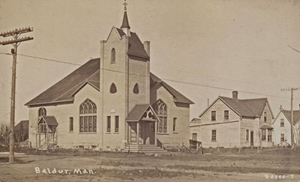 Examples
of his work in Southwestern Manitoba include street scenes of Baldur,
Fairfax, Alexander, and Elkhorn.
Other
work in Manitoba includes photos from Franklin, Birtle, Strathclair,
Plumas, Arden, Bagot, Hargrave, Sidney, Elm Creek, Starbuck, St,
Norbert, Oakville, and Makinak
**See
Profiles Section
Brown
Albert E. “Bert” (?-1916) (Reston)
Albert
worked with the Winnipeg Photo Company at Reston for a period before
moving west, farming near Lethbridge, Alberta for a time. He died of
tuberculosis at Calgary on 2 March 1916.
Burgess
Frederick C. (Hartney)
Campbell,
A.M. (Melita)
Melita
Gallery (open Monday and Friday) was owned by A. M. Campbell, (1887 –
1892) sold to George Davidson (see Deloraine) in 1892 and was open one
to six days a month.
A. M.
Campbell was elected MPP in 1888 - 1899
Chapple,
Gladys (Elkhorn)
Gladys
Chapple was born in 1891 and grew up in the district. Under the
guidance of Mr. J. Mooney she was an ardent photographer, developing
her own pictures, some of which are still quite clear. P218
Clark,
Fred 1914 - 1917 (Deloraine)
Colpitts,
Mr. (Ninette)
Old
timers speak of his driving around the Wawanesa Plains with his horse
and buggy as he went from place to place taking pictures. After
operating the first Ninette post office from Jan. to Nov. of 184 he
sold his farm in favor of a photographer's office in Brandon.
Examples
of his work in Southwestern Manitoba include street scenes of Baldur,
Fairfax, Alexander, and Elkhorn.
Other
work in Manitoba includes photos from Franklin, Birtle, Strathclair,
Plumas, Arden, Bagot, Hargrave, Sidney, Elm Creek, Starbuck, St,
Norbert, Oakville, and Makinak
**See
Profiles Section
Brown
Albert E. “Bert” (?-1916) (Reston)
Albert
worked with the Winnipeg Photo Company at Reston for a period before
moving west, farming near Lethbridge, Alberta for a time. He died of
tuberculosis at Calgary on 2 March 1916.
Burgess
Frederick C. (Hartney)
Campbell,
A.M. (Melita)
Melita
Gallery (open Monday and Friday) was owned by A. M. Campbell, (1887 –
1892) sold to George Davidson (see Deloraine) in 1892 and was open one
to six days a month.
A. M.
Campbell was elected MPP in 1888 - 1899
Chapple,
Gladys (Elkhorn)
Gladys
Chapple was born in 1891 and grew up in the district. Under the
guidance of Mr. J. Mooney she was an ardent photographer, developing
her own pictures, some of which are still quite clear. P218
Clark,
Fred 1914 - 1917 (Deloraine)
Colpitts,
Mr. (Ninette)
Old
timers speak of his driving around the Wawanesa Plains with his horse
and buggy as he went from place to place taking pictures. After
operating the first Ninette post office from Jan. to Nov. of 184 he
sold his farm in favor of a photographer's office in Brandon.
E.
O.
Cooper (Wawanesa – 1906 – 07)
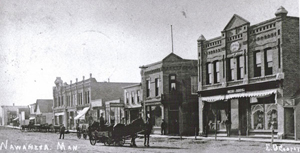
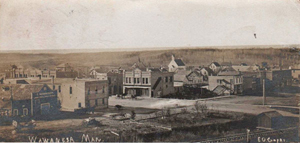
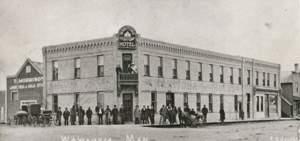 Several
photos in the Wawanesa local history (Sipeweske) are attributed to E.
O. Cooper.
Several
photos in the Wawanesa local history (Sipeweske) are attributed to E.
O. Cooper.
Danellion,
George (Deloraine) 1894 - 96
Davidson,
Alvin 1905 (Deloraine & Cartwright)
Davidson
Brothers – 1898 - Frank Davidson & George Davidson (Deloraine.
Melita and Souris)
The
Davidson Brothers were advertising in In Deloraine 1898
In
1900, Davidson Brothers visited for two week periods from Brandon, and
by 1903, visits were from Souris. In 1908, Davidson Co. Studio was
above T. B. Brooks' store and was open two to three days of every month
until 1925 when the business was sold to W. Brown.
Davidson,
George (Deloraine1890’s)
Mr.
Davidson’s Melita Gallery (1892) moved to Deloraine in 1893.
“Geo.
Davidson, Photographer, has over-hauled and refilled his showcase with
farm and threshing scenes, which gives it a very attractive
appearance.” 1893
'Only
four weeks to think about having your photo taken. Davidson, the
Photographer, closes his gallery April 15th. Cabinet photos $3. per
dozen $2.50 per half-clozen. Davidson, Photographer, Deloraine.
1894
Davidson,
John (Souris – 1883)
Davidson,
Mary ( Souris 1906 – 1908)
Davidson,
W. A. (Melita 1914 – 1925)
Durrant
George E. (Hartney - Elgin)
Little
is known about the personal life of George Durrant, a prolific
photographer who had offices in Hartney and Elgin in the early 1900’s.
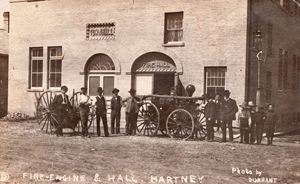 Numerous Hartney
and Elgin scenes were recorded by Durrant.
**See
Profiles Section
Edwards,
Percy Charles (Killarney 1904 – 1952) (Also
served Boissevain, Manitou and Pilot Mound)
Numerous Hartney
and Elgin scenes were recorded by Durrant.
**See
Profiles Section
Edwards,
Percy Charles (Killarney 1904 – 1952) (Also
served Boissevain, Manitou and Pilot Mound)
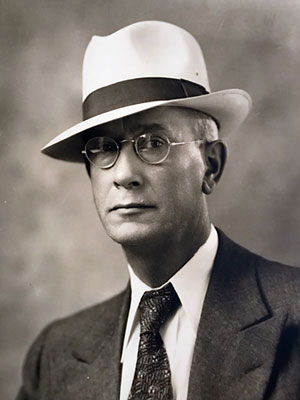 P.C.
Edwards was born into a large family in Kentish Town, London, Eng. He
started in photography at an early age in a large studio in London.
There he became an accomplished photographer and technician and
remembered working on many portraits of Queen Victoria, other Royalty
and heroes of the Boer War.
In 1903
he came to Canada, intending to settle on a homestead in Saskatchewan,
but decided to get off the train in Boissevain. He worked on a farm and
in a tinsmith shop that winter and came to Killarney in 1904 to open a
studio with a Mr. Scott. Scott left for the US in 1910 and PC operated
the studio until his death.
The
studio was first located upstairs on the east side of Broadway about
where No. 523 is now. In 1917 a fire destroyed several businesses in
that part of the block and he lost everything as well as all of the
negatives of the early days of Killarney. Many prints of these
negatives are around today, especially in the JAV David Museum. The
building was rebuilt by P.J. Sherlock and the studio reopened on the
ground floor
P.C.
Edwards was born into a large family in Kentish Town, London, Eng. He
started in photography at an early age in a large studio in London.
There he became an accomplished photographer and technician and
remembered working on many portraits of Queen Victoria, other Royalty
and heroes of the Boer War.
In 1903
he came to Canada, intending to settle on a homestead in Saskatchewan,
but decided to get off the train in Boissevain. He worked on a farm and
in a tinsmith shop that winter and came to Killarney in 1904 to open a
studio with a Mr. Scott. Scott left for the US in 1910 and PC operated
the studio until his death.
The
studio was first located upstairs on the east side of Broadway about
where No. 523 is now. In 1917 a fire destroyed several businesses in
that part of the block and he lost everything as well as all of the
negatives of the early days of Killarney. Many prints of these
negatives are around today, especially in the JAV David Museum. The
building was rebuilt by P.J. Sherlock and the studio reopened on the
ground floor
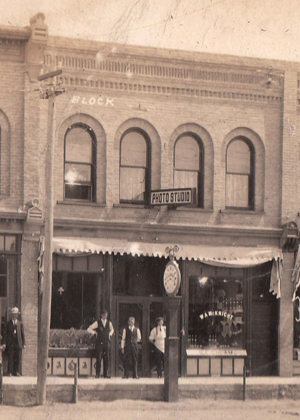 The Edwards Photo Studio in the (first) Sherlock Block
In 1921
he married Florrie McCormick (Hellis) and lived at 538 Clark Ave.
Edith, Florrie's daughter from a previous marriage, lived with them and
their son, John, born 1923.
P.C.
saw many changes in photography, from the days of glass plates to roll
film. In early days he would load up a buggy and drive around the
country taking pictures of the threshing outfits so workers from the
east could send home pictures of the wild west. He operated studios in
Cartwright, Crystal City, Pilot Mound and Manitou for many years.
The Edwards Photo Studio in the (first) Sherlock Block
In 1921
he married Florrie McCormick (Hellis) and lived at 538 Clark Ave.
Edith, Florrie's daughter from a previous marriage, lived with them and
their son, John, born 1923.
P.C.
saw many changes in photography, from the days of glass plates to roll
film. In early days he would load up a buggy and drive around the
country taking pictures of the threshing outfits so workers from the
east could send home pictures of the wild west. He operated studios in
Cartwright, Crystal City, Pilot Mound and Manitou for many years.
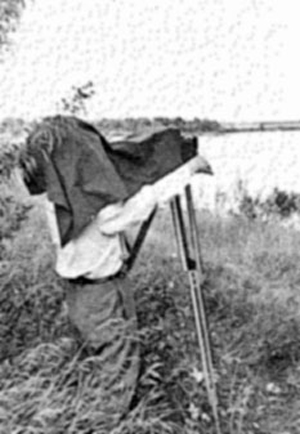
At
Killarney Lake
Edwards
was fond of outdoor photography, which offered special challenges.
An
Anecdote from “Trails & Crossroads”
The
first mixed train reached Killarney on January 3, 1886, according to
the records of the Canadian Pacific Railway. This was a great day for
the people of Killarney. New arrivals came in reasonable comfort by
train, and the day of the long trek to Brandon was ended. The first
regular passenger train arrived on March 28, 1886. It came three times
a week, and going down to see the train come in became a favorite
pastime. Often, however, the train was late. When W. J. Wood brought
his family from England, they had been delayed by icebergs, and his
daughter and her husband failed to meet them. They were standing
wondering what to do when P. C. Edwards, the photographer, spoke to
them and called Mr. Wood by name. He recognized him because he had
enlarged a photograph of him and was able to direct him to the home of
his daughter, Mrs. Thomas Howell.
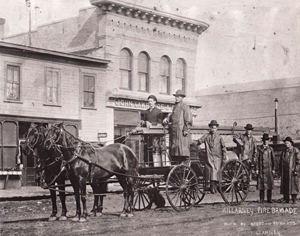 A
photographer did not make much money during the thirties and many a
chicken or quarter of beef was traded for Christmas portraits. With the
war years, business picked up and most of Killarney's servicemen and
women had their portraits taken by P.C. before they went over-seas.
A
photographer did not make much money during the thirties and many a
chicken or quarter of beef was traded for Christmas portraits. With the
war years, business picked up and most of Killarney's servicemen and
women had their portraits taken by P.C. before they went over-seas.
**See
Profiles Section
Everett,
Frank (Baldur)
Frank
Everett and Ellen (Nellie) Everett were married in Berkshire, England,
in 1901. Frank worked at his trade of photographer until, in 1905, they
decided to immigrate to Canada with their son Jack, born in 1903.
Goodwin,
R. (Deloraine 1900)
Gorrill.
Fred (Fairfax 1905)
Graham,
T.S. (Melita)
Jacobs,
Mr. E. F. - Lauder
From the Lauder History….
A file
of several hundred photographs has been gathered. They were copied from
those lent by many people whose help has been very much appreciated. Of
particular interest is a large box full of negatives on 4" x 5" glass
loaned by Frank Jacobs. They were the work of his father, Mr. E. F.
Jacobs, who has probably done more to pre- serve the history of Lauder
and its people than any other person.
His photographs are spread across
Canada and are valued possessions of many of the old timers and their
descendants. Many of the photos loaned were originally produced from
the Jacobs negatives.
Jenkins,
John S. (Deloraine 1906…)
John
Sampson Jenkins was born at Camborne in the County of Cornwall,
England, on October 15. 1861. In 1881 he married Nancy Grundy of
Preston. Lancanshire, England. The family came to Canada in 1887, first
to Aylmer. Ontario and later to Belleville. In 1906 they moved to
Deloraine where they lived until death.
Mr.
Jenkins introduced moving pictures to this part of the Province, with
movies shown for years in the Opera House, as well as travelling to
Waskacla and Napinka for showing there. His Photo Studio was well-known
in the area, having taken over the Davidson Studio soon after coming to
Deloraine. It was operated by Mr. Jenkin and then the business was
taken over by his daughter, Carrie, who had worked with her father.
Jenkins,
Carrie
From
the Deloraine History…
Another
woman next door, Carrie Jenkins, has an equally fascinating occupation.
She is a photographer, in fact, “the" photographer for Deloraine.
Inside her small shop next to the Jubilee Theatre (her father operated
the first movie in town) the smell of chemicals used in photo
processing is pervasive. Carrie has time to spend with boys and shows
them a picture taken when the two of them were just five . - she had
captured them on film right out in front of her shop in the company of
three others, all with suckers in their mouths.
Kohler,
Stanley - Glenboro
Stanley
was a farmer and a photographer. Many of the early photos of events,
families and other activities in the Millford and later the Treesbank
and Stockton areas were taken by him.
Lane
E.L. (Glenboro)
Markle.
W. E. (Boissevain 1892)
W. E.
Markle had very aggressive advertisements in the Globe in Boissevain,
but seems to have been around for only a couple of months.
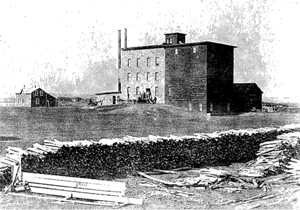 The
first flour mills, a picture taken 1889 - Photo courtesy W.
Moncur p31 BH1
The
first flour mills, a picture taken 1889 - Photo courtesy W.
Moncur p31 BH1
Marshman,
Thomas (Hartney 1891 – 1893)
Martel,
William Angus (Brandon & Area)
There
were several photographers in Brandon that travelled to rural sites.
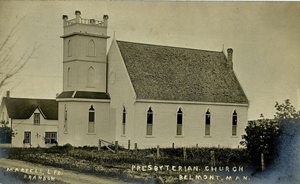 Born in
New York City on 1 December 1851, Martel and his wife Theresa had three
children, all of whom worked with him in the photography business:
Isabel Martel (b 1872), William Angus Martel (1875-1958), and Frank A.
Martel (b 1881). Around 1898, they came to Manitoba and established a
photography business at Brandon, with a satellite studio at Morden,
relocating in 1903 to Winnipeg. The Martels eventually moved to Los
Angeles, California where W. A. Martel opened a studio.
In
1899, William Martel & Son had a tent studio in Melita that
they worked from.
George
A. Martin (Killarney)
Born in
New York City on 1 December 1851, Martel and his wife Theresa had three
children, all of whom worked with him in the photography business:
Isabel Martel (b 1872), William Angus Martel (1875-1958), and Frank A.
Martel (b 1881). Around 1898, they came to Manitoba and established a
photography business at Brandon, with a satellite studio at Morden,
relocating in 1903 to Winnipeg. The Martels eventually moved to Los
Angeles, California where W. A. Martel opened a studio.
In
1899, William Martel & Son had a tent studio in Melita that
they worked from.
George
A. Martin (Killarney)
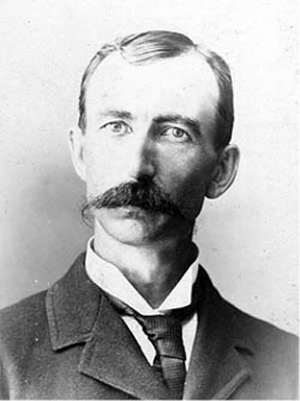 As far
as is known the first photographer in Killarney was a Mr. Martin. He is
listed as one of the “Professional and Business Men in Killarney before
1900.
Born in
Ontario on 23 October 1861, he married Mary A. King (1860-?) at
Hastings, Ontario on 3 January 1883. They had two daughters: Annie M.
Martin (b 1884, wife of Charles Burton McConnell) and Lena M. Martin (b
1892). He died at Killarney on 20 March 1924 and was buried in
Killarney Cemetery.
He
probably did not have a studio and did only a small amount of work.
As far
as is known the first photographer in Killarney was a Mr. Martin. He is
listed as one of the “Professional and Business Men in Killarney before
1900.
Born in
Ontario on 23 October 1861, he married Mary A. King (1860-?) at
Hastings, Ontario on 3 January 1883. They had two daughters: Annie M.
Martin (b 1884, wife of Charles Burton McConnell) and Lena M. Martin (b
1892). He died at Killarney on 20 March 1924 and was buried in
Killarney Cemetery.
He
probably did not have a studio and did only a small amount of work.
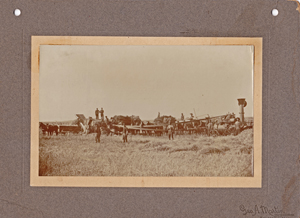
This
threshing scene is by George A. Martin
McKim,
Walter J. – 1899 (Boissevain & Killarney)
McArter,
John - Hartney
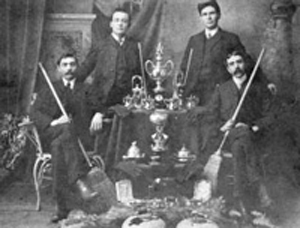
John McArter - seated to the right
John
McArter was born in Huron County, Ontario. He received his public and
high school education there. He took up Professional Photography and
had a studio in Brussels, Ontario. He came to Manitoba first in 1901,
but returned to the East to dispose of his business. He came back to
Hartney in 1904 and bought the Hartney Photo Studio where he was in
business until his death April 30, 1915. He took many pictures of
pioneer farming in the Hartney area. He was an active member of St.
Paul's Presbyterian Church. He was an avid curler, taking part in all
the surrounding bonspiels and coming home with many trophies.
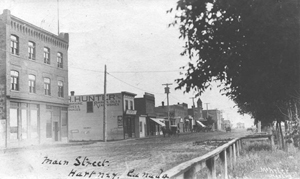 **See
Profiles Section
**See
Profiles Section
McDonald,
Norman - Hartney
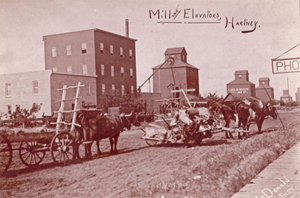 Note
that the Photo Studio Sign is visible in the photo. Norman McDonald
worked in Hartney from 1903 – 07.
Note
that the Photo Studio Sign is visible in the photo. Norman McDonald
worked in Hartney from 1903 – 07.
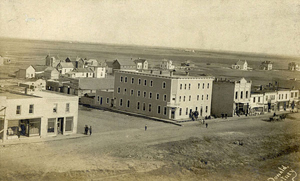 McDonald
also took photos in nearby Elgin.
McKay
John – Farmer and amateur photographer. (Neelin)
McTavish,
A. (Pipestone 1900)
McDonald
also took photos in nearby Elgin.
McKay
John – Farmer and amateur photographer. (Neelin)
McTavish,
A. (Pipestone 1900)
Miers,
James E. (Boissevain 1894 – 1900)
In 1893
James E. Miers established the Boissevain Photographic Studio which he
operated until he sold to W. J. McKim in 1899. In the meantime F. W.
Plows was also doing photography, in 1894.
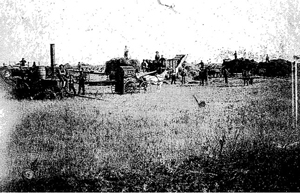 Photographer
Meirs visits Henderson Bros. threshing outfit in the Caranton district
northwest of Boissevain 1887 - Courtesy W. D. Henderson, Brandon
Charles
Ignatious Meyers
Photographer
Meirs visits Henderson Bros. threshing outfit in the Caranton district
northwest of Boissevain 1887 - Courtesy W. D. Henderson, Brandon
Charles
Ignatious Meyers
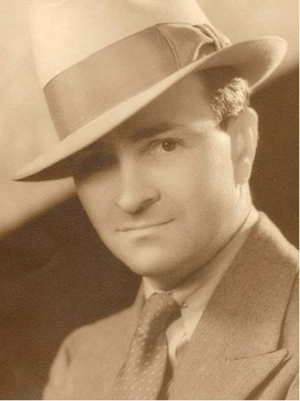 Born at
Toronto, Ontario on 27 August 1892, son of Charles L. Meyers and
Elizabeth Doran, he came to Winnipeg with his family in the early 20th
century where he began working as a photographer. In 1918, in the late
days of the First World War, he enlisted in the Canadian Expeditionary
Force. Following his military discharge in 1919, operating out of a
Winnipeg studio on Notre Dame Avenue, he ventured around southern
Manitoba into the 1920s, taking photographs that were made into
postcards, many of which survive today. He later returned to Toronto
where he continued working as a photographer.
Born at
Toronto, Ontario on 27 August 1892, son of Charles L. Meyers and
Elizabeth Doran, he came to Winnipeg with his family in the early 20th
century where he began working as a photographer. In 1918, in the late
days of the First World War, he enlisted in the Canadian Expeditionary
Force. Following his military discharge in 1919, operating out of a
Winnipeg studio on Notre Dame Avenue, he ventured around southern
Manitoba into the 1920s, taking photographs that were made into
postcards, many of which survive today. He later returned to Toronto
where he continued working as a photographer.
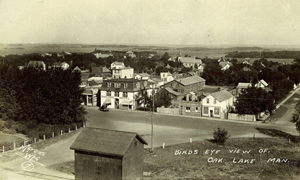 Oak
Lake was a long way from home; often photographers would travel in a
circuit.
Oak
Lake was a long way from home; often photographers would travel in a
circuit.
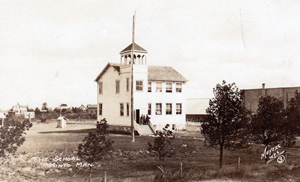 Meyers
has left us several photos of the village of Minto.
Meyers
has left us several photos of the village of Minto.
Morrish
Albert E. (Crystal City 1902 - 1916)
Born at
Goderich, Ontario on 25 December 1881, son of Thomas Morrish (?-1937)
and Louise Jewell (?-?), he moved with his familiy to North Dakota
around 1890, living there until 1902 when they relocated to Crystal
City. Starting around 1904, he began working as a photographer,
operating a studio at Crystal City until 1916 (in partnership with
William J. Stanlake around 1907), and taking postcard views at various
towns around southern Manitoba. In January 1916, he enlisted with the
Canadian Expeditionary Force. Returning from military service, on 15
September 1920 he married Margaret Grace McNeill (1876-1967) at
Winnipeg. In the early 1920s, he operated the Davidson Studio at
Brandon in partnership with Frank W. Weekes. He later had the Morrish
Studio at Neepawa until at least 1947. He died at Neepawa in October
1968 and was buried in the Neepawa Cemetery.
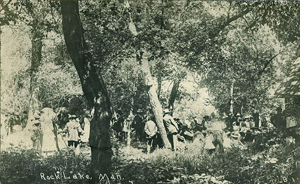 This
photo of Rock Lake is by A. Morrish. He worked in Brandon,
Crystal City, Pilot Mound, and Virden from 1904 – 1923
Murney,
Walter (Baldur 1904)
Walter
Murney was a photographer and worked with S. Frederickson in 1904, as
travelling photographers, selling pictures from 25 cents a dozen up. In
1905, Murney set up a study in T.W. Sexsmith's hotel.
Nelson,
Frank (Baldur, Glenora)
Frank
was born and raised in the Glenora area.
He was
an avid photographer and took post card size pictures, doing all the
developing himself. He was always on hand at the house parties taking
pictures of those present; people were always very co-operative at
arranging themselves for a picture. Many of the pictures are around
today and in very good condition.
This
photo of Rock Lake is by A. Morrish. He worked in Brandon,
Crystal City, Pilot Mound, and Virden from 1904 – 1923
Murney,
Walter (Baldur 1904)
Walter
Murney was a photographer and worked with S. Frederickson in 1904, as
travelling photographers, selling pictures from 25 cents a dozen up. In
1905, Murney set up a study in T.W. Sexsmith's hotel.
Nelson,
Frank (Baldur, Glenora)
Frank
was born and raised in the Glenora area.
He was
an avid photographer and took post card size pictures, doing all the
developing himself. He was always on hand at the house parties taking
pictures of those present; people were always very co-operative at
arranging themselves for a picture. Many of the pictures are around
today and in very good condition.
Nicholson,
John
Based
at Boissevain between 1888 and 1893, Nicholson sold his photographic
equipment in the latter year.
Nicholson,
John - 1892
Boissevain's
first photographer appears to have been John Nicholson, in 1892.
Ongley,
E. E. (Glenboro)
Osborne P.J.
(Boissevain)
By 1904
Osborne's Studio was located over what is now Pringle's store. He was
Boissevain's photographer for many years.
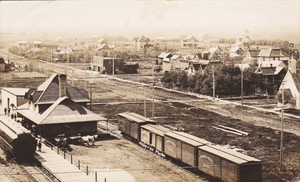 One of
Osborne’s early photos of Boissevain.
Earlier
Mr. Osborne's name appears on photographs in Killarney
One of
Osborne’s early photos of Boissevain.
Earlier
Mr. Osborne's name appears on photographs in Killarney
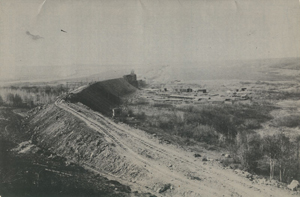 This
photo of the construction of the Great Northern line near Bunclody
bears Osborne’s inscription.
This
photo of the construction of the Great Northern line near Bunclody
bears Osborne’s inscription.
Overend,
George (Ninette)
George
Overend took that first picture of the new-born village photographed
from the west hill, for he was Ninette's first amateur photographer.
Plows.
F.W. (Boissevain ca. 1894)
Paynter,
Joseph – 1899 – 1918 (Carberry)
Pope,
Charles (1900) Melita - Pope had a studio next door to the
Metropolitan
Hotel.
A.P.
(Wawanesa)
An
unknown photographer known only by the initials A.P. also provided some
photos of Wawanesa in its early days.
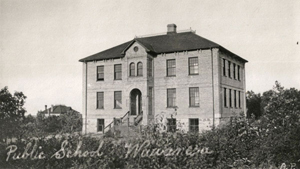
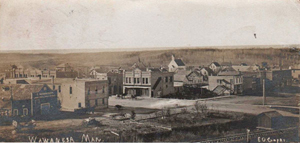
Walter
Royle - Reston
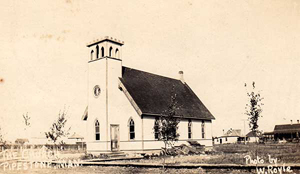 Walter
Royle took this shot of this church that still stands in the village of
Pipestone. He worked there in the 1920’s
Born at
West Didsbury, England around 1887, he graduated from the Glasgow Bible
Training College and emigrated to Canada in 1910, where he was a
student missionary in Alberta. He graduated from Manitoba College in
1914 and became an ordained Presbyterian minister. His first pastoral
posting was at Moore Park, and he subsequently served at Presbyterian
(later United) churches at Tilston, Griswold, Pipestone (1920-1922),
Graysville, Silverton, Elm Creek, Ninga (1936), Rossburn, Dugald
(1937), High Bluff (1943-1944), Isabella (1948), and Basswood
(1953-1954). He retired to Foxwarren in July 1954.
On 9
April 1914, he married Mary Daymond Gardner (1876-1971) in the RM of
Woodworth. In the 1920s, he took photographs around Pipestone that were
made into commercial postcards.
Walter
Royle took this shot of this church that still stands in the village of
Pipestone. He worked there in the 1920’s
Born at
West Didsbury, England around 1887, he graduated from the Glasgow Bible
Training College and emigrated to Canada in 1910, where he was a
student missionary in Alberta. He graduated from Manitoba College in
1914 and became an ordained Presbyterian minister. His first pastoral
posting was at Moore Park, and he subsequently served at Presbyterian
(later United) churches at Tilston, Griswold, Pipestone (1920-1922),
Graysville, Silverton, Elm Creek, Ninga (1936), Rossburn, Dugald
(1937), High Bluff (1943-1944), Isabella (1948), and Basswood
(1953-1954). He retired to Foxwarren in July 1954.
On 9
April 1914, he married Mary Daymond Gardner (1876-1971) in the RM of
Woodworth. In the 1920s, he took photographs around Pipestone that were
made into commercial postcards.
Saunders,
Brabazon Joseph (Napinka, Reston, Waskada 1904 – 1915)
Born at
Islington, Middlesex, England in January 1870, he married Agnes Jane
Muirhead Turner (1866-1946) at Islington on 2 April 1898. He emigrated
to Canada in 1899 and worked as a photographer at Galt, Ontario until
at least 1902. He was living at Napinka as of late 1905, working as a
photographer, either alone or in partnership with Leslie Witmer Eaton.
It is believed that Saunders was the proprietor of the Winnipeg Photo
Company, which produced good quality postcards showing scenes
throughout southwestern Manitoba and southeastern Saskatchewan. These
areas are consistent geographically with the satellite studios that
Saunders operated in this region. By 1916, Saunders had moved to
Winnipeg where he worked as a baker. By 1921, he was operating the
photography studio Goodfellow & Saunders at Mount Dennis.
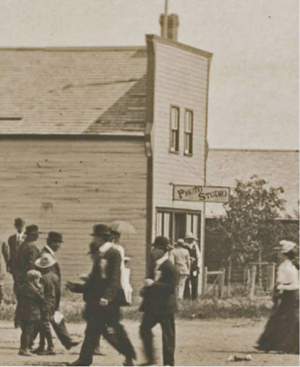 Saunders
was on the Napinka Voters List from 1902 – 1912 and listed
as a resident, B. Saunders, photographer 1905 – 1913.
In 1911 he was established at Block 4 Lot 13
This
photo of Rock Lake is a fine example of the work of the Winnipeg Photo
Company.
He was
also listed as: Saunders Art Studio (191) : Saunders &
Eaton (Reston & Waskada) 1906 , and may have been involved in
the Western Photograph Company – 1914 – 1915
**See
Profiles Section
Scott,
Mr. In 1904 Mr. Scott and P.C. Edwards bought a studio in Killarney
from a Mr. McKim.
Silverdale
& Nelson (Melita & Area - Outdoor
photographers,
were in the area in 1914)
Smith,
Ernest R. T. (Carberry)
Smith,
Edgar (Glenboro)
Edgar
Smith, son of John B. and Sarah Smith, was born in Nottingham, England,
April 21, 1873. Following his school education he learned the
photographic trade from his father, who was in the photography business
under the name of J. B. Smith and Son (oldest brother, Fred) and they
had won prizes for their photographs from 1865 to the 1880's.
In 1903
Mr. E. Smith came out to Canada and went to Grenfell, Saskatchewan
where he worked at bricklaying until April 1904, when he went back to
England and married Ada L. Hall, daughter of George and Louisa Hall.
Following their marriage they came to Canada and settled in Glenboro,
Manitoba.
He
purchased the Photographic Studio from E. L. Lane and was in this
business until 1922
Stephens,
C.B. (Deloraine) Photo Art Studio - C. B. Stephens.
Artist.
Stevens,
Fred (Baldur 1890’s)
In the
summer of 1882, Fred Stevens came to Manitoba from England, to seek his
fortune in farming. After looking around, he decided on W 28-4-14. If
he had known how many stones would have to be removed, he would have
located elsewhere. He and his neighbours erected a log house in 1882.
The house was lived in until 1937.
He
continued to farm until the boys were old enough to carry on. Fred and
Elizabeth moved to Baldur in 1920, when Fred purchased the "Baldur
Gazette". He operated it until his death in 1940.
Several
examples of Fred’s photography appeared in a Special Historical Edition
of the Baldur in Sept. 1899.
Saunders
was on the Napinka Voters List from 1902 – 1912 and listed
as a resident, B. Saunders, photographer 1905 – 1913.
In 1911 he was established at Block 4 Lot 13
This
photo of Rock Lake is a fine example of the work of the Winnipeg Photo
Company.
He was
also listed as: Saunders Art Studio (191) : Saunders &
Eaton (Reston & Waskada) 1906 , and may have been involved in
the Western Photograph Company – 1914 – 1915
**See
Profiles Section
Scott,
Mr. In 1904 Mr. Scott and P.C. Edwards bought a studio in Killarney
from a Mr. McKim.
Silverdale
& Nelson (Melita & Area - Outdoor
photographers,
were in the area in 1914)
Smith,
Ernest R. T. (Carberry)
Smith,
Edgar (Glenboro)
Edgar
Smith, son of John B. and Sarah Smith, was born in Nottingham, England,
April 21, 1873. Following his school education he learned the
photographic trade from his father, who was in the photography business
under the name of J. B. Smith and Son (oldest brother, Fred) and they
had won prizes for their photographs from 1865 to the 1880's.
In 1903
Mr. E. Smith came out to Canada and went to Grenfell, Saskatchewan
where he worked at bricklaying until April 1904, when he went back to
England and married Ada L. Hall, daughter of George and Louisa Hall.
Following their marriage they came to Canada and settled in Glenboro,
Manitoba.
He
purchased the Photographic Studio from E. L. Lane and was in this
business until 1922
Stephens,
C.B. (Deloraine) Photo Art Studio - C. B. Stephens.
Artist.
Stevens,
Fred (Baldur 1890’s)
In the
summer of 1882, Fred Stevens came to Manitoba from England, to seek his
fortune in farming. After looking around, he decided on W 28-4-14. If
he had known how many stones would have to be removed, he would have
located elsewhere. He and his neighbours erected a log house in 1882.
The house was lived in until 1937.
He
continued to farm until the boys were old enough to carry on. Fred and
Elizabeth moved to Baldur in 1920, when Fred purchased the "Baldur
Gazette". He operated it until his death in 1940.
Several
examples of Fred’s photography appeared in a Special Historical Edition
of the Baldur in Sept. 1899.
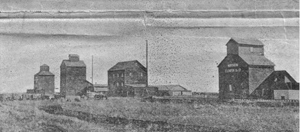
Winnipeg
Elevator, Dominion Elevator, Roller Mill, Rink, Northern Elevator
Alexander
Barton Thom [A. B.] (1849-1926)
Thom’s
photographic achievements throughout western Canada in the 1880s and
1890s have been described as “among the most artistic and professional
in the West for that period,”
Thom
was born at Stratford, Ontario in February 1849, His younger brother,
John S. Thom Jr., established a general store at Lucan, Ontario where
he also dabbled in photography. Perhaps this is where Alexander got his
start in the craft. Thom arrived in Manitoba sometime in 1880 and in
October purchased a lot at Nelsonville, where he intended to open a
photography studio in the spring of the following year.
By May
1883, Thom had formed a photographic partnership at Winnipeg with Fred
V. Bingham, which lasted until 1886. During this period, Thom was
primarily an itinerant who spent much of his time travelling in western
Canada, taking numerous photographs in the spectacular mountain ranges
west of Calgary. During 1886, for example, he took over 2,000 views
along the Canadian Pacific Railway route through the Rockies.
Thom visited England briefly in
early 1887 to obtain a special lens designed for taking mountain views,
which he used from 1887 to at least 1889. During the winters of 1885
through 1889, and possibly later, he spent his winters travelling
through the USA and England, giving presentations illustrated with his
images. Thom believed the presentations benefitted the Canadian Pacific
Railway and immigration to western Canada, and he used this argument to
support his request that the railway provide a railway car as a
portable photographic studio.
Thom
maintained his base of operations in Manitoba. In 1890, he resided at
Stonewall, then at Winnipeg from 1891 to 1894. In 1892, he opened a
studio at Carman with a Mr. Pontreath in charge. He had a studio at
Regina from 1894 to 1897, and one at Brandon from 1896 to 1900 with a
satellite studio on Fourth Street in Wawanesa from 1897.
After
closing his Wawanesa photography studio in 1904, Thom settled down to
the life of a bachelor farmer on a homestead southwest of St. Claude.
Watson
J.A. (Melita 1896 – 1899)
Watson,
W.J. (Souris 1892 – 1894)
Watt,
F.E. (Melita) In 1905-1907 F. E. Watt worked from a
small
building near the Methodist Church, and with a tent visited small towns
around, their visits lasting two to three weeks at a time
Winnipeg
Photo Co. Office (Napinka 1904 – 1913) (Waskada & Reston)
Take a
look at the inscription on this photo taken in Waskada. It reads,
“Winnipeg Photo Co. Napinka. One finds that notation on many old
photos from the region. A visitor to Napinka today might find it odd,
but in the early 1900’s, Napinka had a Photo Studio. That tells
us two things. First, Napinka was a much bigger town in 1904. But, even
so, there was work for photographers everywhere. It was a service that
was seeing a surge in demand, as pioneer farmers and businessmen were
becoming established and had finally had a bit of disposable income.
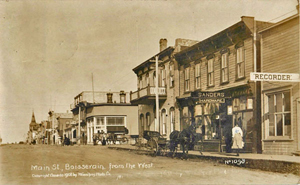 Brabazon
Joseph Saunders was the proprietor of the Winnipeg Photo Company, based
in Napinka with satellite studios elsewhere in the region. Saunders was
on the Napinka Voters List from 1902 – 1912 and listed as a
resident, B. Saunders, photographer 1905 – 1913.
The
Winnipeg Photo Company has left us the most extensive existing
photographic record of a region stretching from Cartwright to Pierson
and Reston. The photos are among the highest quality to have been
passed down from the first decade of the 20th century.
Brabazon
Joseph Saunders was the proprietor of the Winnipeg Photo Company, based
in Napinka with satellite studios elsewhere in the region. Saunders was
on the Napinka Voters List from 1902 – 1912 and listed as a
resident, B. Saunders, photographer 1905 – 1913.
The
Winnipeg Photo Company has left us the most extensive existing
photographic record of a region stretching from Cartwright to Pierson
and Reston. The photos are among the highest quality to have been
passed down from the first decade of the 20th century.
**See
Profiles Section

|

|

|